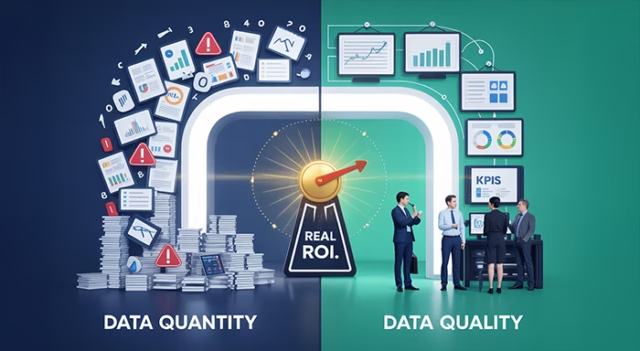In today’s data-driven business era, most companies prefer outsourcing analytics as a way to achieve strategic insights without necessarily spending much on in-house infrastructure. However, amidst the big data and advanced analytics hype, one serious argument has not influenced such initiatives’ success yet: data quality versus data quantity.
Organisations tend to fall prey to the temptation of knowing how much data they can gather and not how well that data is. But in real ROI on outsourced analytics, quality is always going to trump quantity, particularly in surmounting the risks of threats and challenges of data analytics outsourcing and how to deal with them.
The Temptation of Data Quantity
With enormous amounts of data coming from websites, apps, sensors, and third-party APIs, it’s easy to believe more data means better outcomes. Outsourcing partners tend to sell their value proposition in terms of managing “big data” and extracting insights from millions of records. This is helpful, but raw volume typically doesn’t insure success.
Here’s why:
- Redundancy: There’s often redundant or irrelevant information in excess data.
- Noise: Bigger datasets generally have more anomalies or outliers.
- Cost: It is very expensive to deal with and store massive datasets.
- Complexity: Additional data may complicate models and make decision-making slower.
Without structure, governance, and verification, additional data means more confusion. That is why it is necessary to shift the emphasis from quantity to quality.
Why Data Quality Matters More
High-quality data is timely, accurate, relevant, complete, and consistent. It aligns perfectly with business objectives and is clean enough to take action. Regardless of whether it is a customer’s purchasing history or sensor values from factory equipment, good data alone enables valuable insights.
Good-quality data enhances:
- Model accuracy: Good data leads to good decisions and forecasts.
- Efficiency: Clean data eliminates processing time and human effort.
- Trust: Managers will be more willing to act on conclusions drawn from credible data.
- Compliance: Credible data is a guarantee of compliance and privacy regulations.
When you outsource analytics, data quality matters even more because you are leaving it to the external organization to make sense of your business universe. Poor quality data can result in poor strategy, wasted resources, and tarnished reputation.
The Role of Outsourcing in the Quality vs. Quantity Debate
Outsourcing analytics has become a common approach to scalability, access to high-quality talent, and cost competitiveness for organizations. The model does have its inherent complexities, though, that affect both reliability of insights and data quality.
Problems and dangers of outsourcing data analytics and how they can be addressed are directly interlinked with how organizations balance quality and quantity. These are:
1. Lack of Contextual Awareness
External partners or outsource experts might lack business context or domain knowledge and therefore misinterpret the metrics or focus on the wrong ones.
How to bridge it:
Have constant collaboration between external and internal analysts and stakeholders. Have full documentation of the business, frequent reviews, and feedback loops.
2. Data Silos and Interoperability Issues
Poor integration of the data systems tends to cause fragmented insights. The providers might operate in silos, furthering the issue.
Solution:
Invest in integrating data tools and provide the outsourcing team with single, centralized, structured data sets.
3. Security and Privacy Concerns
Business and customer confidential information may be compromised while being sent to third-party entities.
Solution:
Partners who are capable of managing compliance with global data protection regulations (such as GDPR or HIPAA). Implement anonymization of the data where necessary and implement proper access controls.
4. Excess Focus on Volume
Outsourced analytics groups will concentrate on doing huge volumes to demonstrate capability, rather than on data refinement or validation.
How to overcome it:
Establish KPIs on accuracy, relevancy, and alignment with business, rather than data volume processed. Invite partners to highlight quality measures and validation procedures.
Calculating ROI: Quality-Driven Analytics in Action
Real ROI from analytics is not built by the number of dashboards you possess but by how many good decisions your dashboards enable. Quality-focused analytics assist:
- Enhance customer segmentation and targeting
- Enhance operational processes
- Better forecast future trends
- Guide more informed investment and resource decisions
High-data-quality outsourced analytics providers produce these results quicker and more consistently. It’s not a question of “how much” data they dig through—it’s how well they scrutinize.
Strategic Recommendations
To achieve the optimal balance and realize the greatest value of outsourced analytics:
- Begin small, expand judiciously: Start with targeted, quality-checked datasets and then expand.
- Establish quality standards: Include data accuracy, completeness, and relevance in the vendor agreement.
- Audit on a regular basis: Track outsourced results against internal benchmarks.
- Invest in governance: Formalize internal roles or committees for outsourcing partnership management and data quality oversight.
Conclusion
As they compete to become data-driven, organizations are likely to be tempted by big data and fail to appreciate the underlying value of data quality. As they outsource analytics, the risks and disadvantages of data analytics outsourcing and how they can be addressed need to be confronted squarely in order to capture long-term value.
Selecting quality over quantity isn’t a philosophical position—it’s a pragmatic one. The best companies now recognize that clean, organized, context-enriched data—accompanied by a trusted partner—is the true power behind smarter decisions, improved performance, and real ROI.







